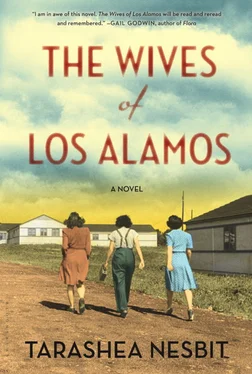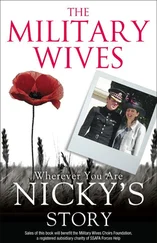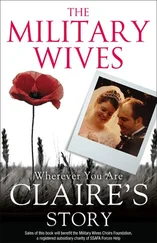OUR MOTHERS WERE ill or our fathers had birthdays and we could not visit. But we learned—in a way that we never wanted to—that there was an exception. We packed our suitcases and took trains to Duluth, to Los Angeles, past the soda shop where our first loves kissed us, past the service flags and blue stars hanging in windows—we could see who had gone off to war while we were gone—and past windows where blue stars were replaced with gold. Back into our parents’ houses, back into our mothers’ arms, to the funeral parlors of our hometowns, where we stared into the faces of our own dead brothers.
A FEW OF us got an exception of a different nature. Our sisters announced their sweethearts were coming home and they were getting married. Though our husband’s request for both of us to travel to San Francisco for the wedding was denied, a wife was permitted to go, and we busied our summer with correspondence to our sister about color schemes, florists, and menus. It was the first time in a long time we’d thought about the outside world. Searching through boxes in the back of our closet for nice gloves and a presentable dress for the wedding brought back memories of home. We could smell the sea again. How were the neighbors we’d left behind? Was the pharmacist still frowning as he counted pills? How was the butcher? Had the weeds grown tall around our house and was someone else living there?
OUR PARENTS MET us at the train station while our sisters, weak from wedding preparations, were in bed with pneumonia. Their future husbands, who had arrived from the Pacific two days earlier, were lying in their own childhood beds across town. Our first thought about our parents was, They look tired , or, They look so much older , and they probably had the same thoughts about us, too.
ON THE DRIVE home we chatted but only half listened and recall little—something about the neighbors’ dog, something about the tree in the front yard—but on our minds instead was the cool sea air and the familiar, cleanly designed bridges that brought out a feeling of grandeur in us as we crossed them, as if the feat of their construction was somehow ours as well.
BACK IN OUR hometowns, past the doorman, the mailman, up the stairs, inhaling the bay, the bakery, the trash in the alley, the soft light, the sound of a foghorn. And up two flights or into the elevator we went. We closed the brass gate and looked above to see the white clouds of New York through the skylight, and we arrived at our door and rang the bell just because we could. We picked up the telephone to hear the operator ask us what number we would like to reach, and we dropped our suitcases in the entryway to our bedroom and remembered what this home offered that we had not been in for years: a shining porcelain bathtub. Our mothers kept our sons and daughters occupied while we soaked until our fingers and toes wrinkled.
WE FOUND OUR sisters tired from their illnesses but ecstatic. They asked us for advice. We warned them of dehydration caused by nerves— drink water constantly —and we told them to take nothing as a sign, unless it was a good sign. On the eve of our own wedding our husbands woke with their legs as tight as statues, their veins visible like a colt’s; they woke and stood and collapsed on the bed and if we thought, Is this a sign? we did not say it, and our husbands did not say it. Anyway, really, it was not a sign, we told our sisters, it was our anxiety, it was dehydration. Drink more water than you think possible.
WE WERE TIRED of borrowing Jane’s green dress, even though we told one another, It’s not the size of the wardrobe that counts, it’s the shape . We felt better about ourselves when we glanced at Ruby’s sagging hemline, when we considered Annie’s matron bulge.
WE CONSPIRED TO stop wearing decorative hats and delicate stockings because this was the new power; to have been here longer was to have more authority. And one way we had authority was by knowing the fashion of this place. We wore blue jeans and cackled over the new girls who wore heels. Did you see her get stuck in the mud outside the post office? Poor girl. She’ll never get those clean! Or we tried to avoid this kind of talk.
WE TOLD THE new arrivals—Pauline with the pink half-moon manicure that called attention to her stubby hands, Doris with the upswept victory roll, Betty with the calm voice—what was what in this town. Those are the bathtub houses, those are the four-family houses, those are the Quonset huts, and those are the trailers. We told the new girls, You are going to need a year’s supply of lotion for just one month here. We watched them notice the dryness and lick their lips. We thought of our own dry lips and hands when we first arrived and we thought, Silly thing, you are only making it worse .
WE RECOLECTED HOW we, too, were horrified when we first arrived to see women wearing blue jeans or ski suits. How we cussed at the runs in our stockings created by brushing against a table, a piñon branch, or who knows what. How we were down to one pair of silk stockings with no way to get more. The fashion magazine Glamour came to Shirley in the mail and she read aloud to us: There’s no substitute for a daily bath as the groundwork of glamour! And we all longed for a bath we could not take, and Esther said aloud what we all thought: Oh, be quiet. And she shut the magazine.
OUR ATTIRE TOOK on the drab camouflage of the surroundings; the beige and muted tones of the desert became our wardrobe—and we could see how this attire appeared to an outsider, to the newly arrived. There was the sunlight’s skill at color and though we were subtle, though we often blended into the background, we left our red lips on one another’s coffee cups and highball glasses.
DORIS LED THE charge of wearing broomstick skirts and Indian jewelry, perhaps thinking it would endear us to the Spanish Americans and Indians. We agreed that if you were in the soup it was best to swim.
SEPTEMBER CAME, AND inside our duplexes and apartments we heard the sounds of other families: thuds, bedsprings, a pattern of toy trucks being thumped on the floor, the rhythm of brooms, of vacuums, of steps, of typewriter keys. We heard timers, shower curtains, radios, faucets, the scrubbing of floors, our neighbors singing along. We heard the especially painful wails of children who were not our own.
ON OUR NEIGHBORS’ radios, which wafted into our living rooms, inescapable, we heard the weather interrupted to report, instead, that U.S. forces had landed in the Philippines. These were routine interruptions, almost as regular as Bob Hope ending every show with Bye-bye, and buy bonds .
IF WE JOINED the square dance group we made squaw costumes and wore heavy Indian jewelry. The colors of our husband’s badges were forgotten then, and we said it was the most inclusive place on the Hill, our square dance group, and we did not think about how those of us in this group were all Catholic. And no trailer mothers wanted or found time to lead the Cub Scouts, and so their boys were discouraged by some of us from joining the Cub Scouts. Nevertheless, Carol arranged for a sandbox and swing set to get their children out of the streets and a Quonset hut with a Ping-Pong table and a Victrola for the teenagers. We led the City Council and won the battle to keep our spare-room apartments as well as the fight not to expand the firing range.
PERHAPS THE WACs thought we were prima donnas. Cecilia said they resented being told they were going to an island but had to come here instead. When we asked for carpet in the bedroom they narrowed their eyes as if to say our lodging was already too luxurious. If you want it you’ll have to buy it and install it yourself .
Читать дальше












